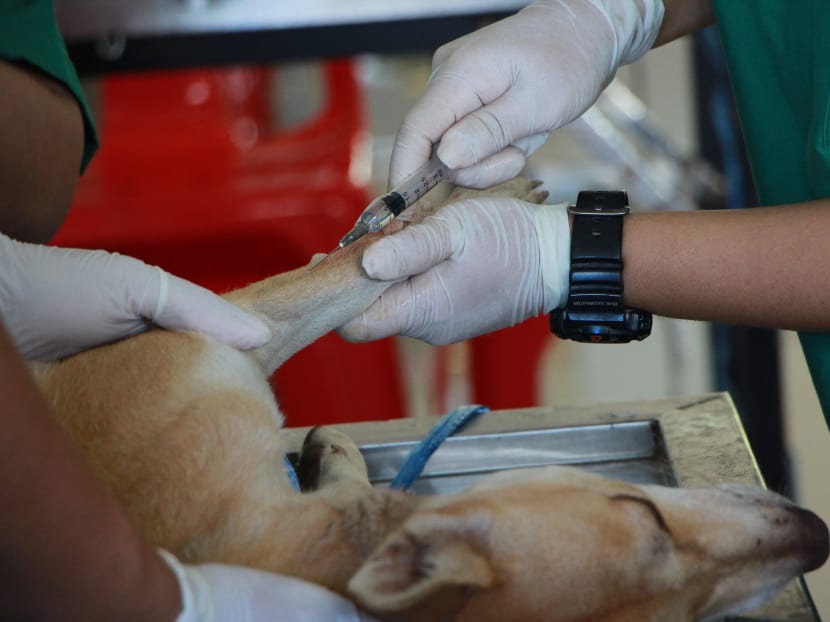Not all pet owners know of vaccines or use them, vets say new guidelines help set clearer standards
SINGAPORE — She is a dog owner, a dog therapist for seven years and has been running a dog boarding centre for a decade, where she looks after dogs when their owners have to travel. Even with such experience, Ms Ruth Lim, 47, has not been vaccinating her own pet dogs for at least the past five years. They are all above 10 years old — or the equivalent of a 50- to 60-year-old human.
- On Nov 18, the National Parks Board and Singapore Veterinary Association released vaccination guidelines for dogs and cats
- A small group of pet owners here are reluctant to vaccinate animals under their care
- They are wary of over-vaccinating and potential side effects
- Others are not aware of the importance of vaccination
- Veterinarians said that the new guidelines will provide clearer standards for pet owners and veterinarians
SINGAPORE — She is a dog owner, a dog therapist for seven years and has been running a dog boarding centre for a decade, where she looks after dogs when their owners have to travel.
Even with such experience, Ms Ruth Lim, 47, has not been vaccinating her own pet dogs for at least the past five years. They are all above 10 years old — or the equivalent of a 50- to 60-year-old human.
Ms Lim is part of a small group of pet owners in Singapore who are wary of vaccinating their pets.
On Nov 18, the Animal and Veterinary Service (AVS) under the National Parks Board (NParks) and the Singapore Veterinary Association jointly released vaccination guidelines for domesticated dogs and cats.
The Singapore Vaccination Guidelines for Dogs and Cats 2020 list different core and non-core vaccines, and provide recommendations for pets at different stages of life and in different living environments, including in single-, multi-pet households and shelters.
Core vaccines for dogs protect against canine distemper virus, canine adenovirus and canine parvovirus. For cats, core vaccines protect against feline parvovirus, feline calicivirus and feline herpesvirus.
AVS and the Singapore Veterinary Association said: “The guidelines will improve awareness and understanding among various stakeholders, including pet owners, animal welfare groups and pet businesses, of the importance of vaccinating the animals.”
In September, a fatal disease that primarily affects rabbits has been detected in Singapore and AVS said that it will work with veterinary clinics and distributors on the import and registration of vaccines.
In general, the guidelines advised that adult dogs and cats should be given a booster shot within one year of their last dose of the initial puppy or kitten vaccinations.
While core vaccines are typically given on yearly booster intervals, the guidelines said that veterinarians can recommend different re-vaccination frequencies after assessing the pets and discussing with owners.
The vets interviewed by TODAY also said that they will prescibe a vaccination schedule based on their assessment of the animals.
For Ms Lim, she vaccinated her dogs when they were still puppies, and then in alternate years until they turned five. “I realised that there isn’t any need for a yearly vaccination,” she said.
Her dogs go for yearly checkups and she will vaccinate them if they are exposed to higher-risk factors such as if they have to travel abroad.
She is concerned about the potential side effects such as lethargy, and with over-vaccinating. She was told by a veterinarian that one vaccination could effectively last two to three years, so there is no need for yearly vaccinations.
Ms Lim would rather spend the money on supplements to ensure her dogs’ health and immunity. “I’ll feel more worried if I take them for vaccination every year.”
She has also met other pet owners who no longer feel the need to vaccinate their dogs, especially as they age.
Another pet owner who gave her name as just Ms Virg, 51, also believes that vaccinating domestic pets is “really unnecessary”. The business facilitator has been a dog rescuer for almost 10 years.
She would rather use alternative methods to maintain her 12-year-old dog’s health, such as by giving it probiotics and rice water to treat diarrhoea, instead of taking it to the clinic.
“It’s just whatever suits us and whatever works,” she said. “It works for us, but it may not work for other people.”
For retiree Lucy Tan, 65, she vaccinated her 13-year-old dog when it was still young and that was it. “I think it’s not important (to keep vaccinating).” She said that her dog is healthy, so vaccinations do not cross her mind.
When advertising executive Jean Paul, 48, and his family first got their labrador retriever, they took it to get three puppy shots. Four hours after the third vaccination, its face started swelling and he had to take it to the hospital.
Despite the negative experience, he said: “Vaccinations are important. It’s being done to keep (the dog) safe.”
His dog is 19 months old now and Mr Paul intends to let it have its yearly vaccinations following the vet’s advice.
For Ms Elaine Tan, a 32-year-old marketing manager, instead of letting her six-year-old dog do its usual yearly vaccination, she let it go for a titre test — which measures the amount of antibodies — before getting her dog vaccinated.
Results showed that it needed just a leptospirosis vaccination and she will take her dog for the vaccination in December.
Ms Tan went for the titre test because she came across a study that showed that over-vaccination might lead to cancer in dogs. However, she said that the study was not conclusive, because there are many factors involved.
“As a pet owner, sometimes I’m also very confused,” she admitted.
WHAT VETS SAY
Dr Kasey Tan, a senior veterinarian at Mount Pleasant Vet Centre (Serangoon North), said that some owners are indeed worried about over-vaccination, especially when their pets are older.
However, he said that they need not have such worries. Owners of older pets have the option to ask for a serology test, or a VacciCheck antibody titre test, which is available as an objective measure to recommend vaccination, he said.
Dr Tan said that most of the owners at his clinic are up to date on their pets’ vaccines, but about 10 to 15 per cent are against vaccination.
“Another 20 to 30 per cent of pet owners are not aware of the importance of vaccination or think that it’s not necessary.”
Dr Chua Hui Li, senior and head veterinarian at The Housecall Vet SG, said that while some of these owners are unaware of the importance of vaccination, others may be “a little bit scared”.
She said that most will get the shots done for puppies, but might not be willing to do a yearly vaccine.
“Or they say that their dog doesn’t really go out and then they never vaccinate the dogs for many years,” she added.
Dr Liang Xutian, who has been a vet for 12 years, said that she has not met many pet owners who are against vaccinating.
However, some might develop negative feelings towards vaccinations if their pets developed a sterile abscess — a lump at the site of injection — after being vaccinated previously.
With the latest guidelines issued by the authorities, Dr Chua from The Housecall Vet SG said that these will help vets explain the importance of vaccinations, especially to clients who are wary of vaccinations or think that vets encourage yearly vaccinations to make money.
Pet owners who have misconceptions can refer to the guidelines and ask their vets for more information, she said.
“There is at least a proper official information sheet,” she said. “I don’t want them to go online and Google all these diseases (and the prevention methods). We don’t really know where they end up at to get the info they need.”
Dr Chua added that there are not many such clients who turn to the internet for information in making decisions but she does encounter a few of them. “Some are more discerning than others and some will still check in with us,” she said.
Dr Michelle Loh, a veterinarian with Polaris Veterinary Services, said that the guidelines are helpful. “There’s clearer guidance on more uniform standards for vaccinations.”
The vaccination guidelines can be found on NParks' website.









